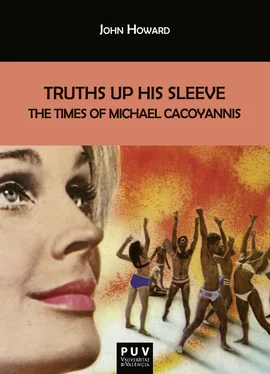Acting, Directing, Applying Polish
In 1942 at the tender age of twenty-one, Michael Cacoyannis qualified as a barrister-at-law and enjoyed the unqualified support of his supervisor at the African Service, which broadcast over the BBC’s dubious color-coded Brown Network. With his family in faraway Southern Rhodesia, Michael cast aside any notion of practicing law. With skill and dexterity, he navigated the London performing arts scenes, continued to write and produce radio programs, and found new opportunities to both direct and act in theatre productions, under the stage name Michael Yannis. Comfortable at the studio microphone, he now learned to project his voice in English theatres, in roles of increasingly complexity and prominence. With bit parts in film and decent roles on BBC television, he would project his image onto the consciousness of a nation supplementing love for radio with TV. Since British movie professionals had yet to found a film school, Michael’s varied stage, small, and big screen experience proved an unsurpassed method for mastering the tricks of the motion picture trade.
After an informal probationary period at the Cyprus service—in which almost no one dared contradict him—Michael joined amateur BBC troupes in two wartime productions benefiting the Aid for Russia Fund. In J. B. Priestley’s detective comedy Mystery at Greenfingers , set in a Peak District hotel with a large ensemble cast, Michael played chef Arnold Jordan. Then, in another three-act three-performance ensemble production, Michael stood out as law office manager Eric Brewer in John Van Druten’s London Wall , which earned another two performances to support Hampstead General Hospital. It also earned Michael his first review, a favorable one. The critic praised Michael’s portrayal of a “philandering” legal professional—a regular “Don Juan” having an affair with “a pretty 18-year-old typist.” True to life, Michael gave a convincing well-practiced performance of a heterosexual lawyer, “tackl[ing] this somewhat unsavoury character with skill and assurance.” Emboldened, Michael next directed and starred in two Greek-language benefit productions, Cypriot George Fasouliotis’ From One Day to Another at Bloomsbury’s Tavistock Little Theatre and Greek Dimitris Dimitriades’ Souls in War at Notting Hill’s Mercury Theatre. 21
In addition to acting classes at the Central School of Speech and Drama, Michael found time and money for private singing lessons under soprano Beata Grenelli. Fearless on the outside, “trembling” inside, he gave a tenor recital in 1944 at London’s august Wigmore Hall, alongside soprano Marianne Jüer. Accompanied by renowned pianist Ivor Newton, the two punctuated the program—beginning, middle, and end—with popular duets from Bizet’s Carmen , Puccini’s La Bohème , and Strauss’ The Gypsy Baron . In solo numbers, they sang yet more recognized works of the French, Italian, and Austrian repertoires. However, Michael boldly offered pieces by Cypriot composer Lontos and Greek composer Kokkinos. Throughout, the recital elicited round after round of applause. “After all,” Michael said, “the room was full of friends.” Whatever the accusations of operatic elitism, Michael still considered himself a struggling performer who remained true to his roots in Limassol, whether singing Lontos or delivering lines by Fasouliotis. 22
Michael’s one-off recital helped him conquer stage fright and take on new acting and directing challenges. With three weekly evening broadcasts at the Cyprus Section sacrosanct in his calendar, Michael’s BBC workload otherwise offered flexibility. By 1947, Michael had scrimped and saved enough money for directing classes at London’s legendary Old Vic School, revived after the war by daring experimentalist Michel Saint-Denis, former head of the BBC French service. However, with bit parts in London film productions and with ever more demanding stage roles, Michael’s attendance at Old Vic classes lagged. Nonetheless Saint-Denis commended Michael’s “lively interest,” even as tutors doled out banal remarks familiar to generations of English students. “He is not without ideas,” wrote one weary tutor. “He can be quite practical.” Most of all, Michael earned the recognition of Old Vic School assistant director Cecil Clarke, who would go on to produce important films and TV dramas such as 1984’s Biko Inquest . According to Clarke, Michael “showed a keen interest [and] gained a groundwork for his future in the theatre.” For Clarke at least, that future in theatre seemed certain. 23
Michael too began to believe, as he landed first supporting, then leading, and eventual title roles on London stages. By the late 1940s, he felt confident enough to resign from the BBC to work full-time as an actor. Superiors at the BBC respected his decision and proposed an ongoing relationship of ad-hoc assignments, to Michael’s great relief and delight. Now with single-minded conviction, he answered casting calls, studied his lines, attended rehearsals, reviewed blocking, and took notes on production details. Few doubted his determination. In 1947, Michael landed a role as one of many clients of Maya , French playwright Simon Gantillon’s 1924 Mediterranean port prostitute. Evading the British monarchy’s theatre licensing—and censoring—Lord Chamberlain’s office, the “sultry” production was mounted at the members-only Arts Theatre Club at Leicester Square. In a major role that same year with non-profit co-operative Centaur Theatre Company at Rudolph Steiner Hall, Michael played Herod in Salome . Here Michael was in his element: another sexy controversial play, this time by great gay writer Oscar Wilde. One critic lauded Michael’s “powerful acting,” while another praised his commanding stage presence and voice: “He looked the part and spoke with pleasant and varied force.” In a New Theatre magazine review, Michael was included among “members of the cast [who] acquitted themselves well.” To accompany the review, Michael was depicted in a striking line drawing as Herod. 24
Likewise 1948 offered two roles in plays by a contemporary French writer and an Irish master. In Bernard Shaw’s Captain Brassbound’s Conversion at the Lyric Hammersmith, Michael was typecast as a southern European, Italian sailor Marzo, described by one critic as “a perfect cameo sketch.” At the Players Theatre, just off the Strand, Michael took the role of Ulysses in Armand Salacrou’s The Unknown Woman of Arras , which is told in a series of flashbacks as Ulysses contemplates suicide. “In the manner of expressionist cinema,” as theatre historian J. L. Styan explains, the play “mix[es] onstage the dead with the living. Salacrou enjoyed devising theatre games, juxtaposing styles, illogically manipulating place and time, introducing elements of parody and burlesque.” Michael was up to the challenge. In this “kaleidoscopic” play ultimately about “sex, and sex, and still more sex” according to one London critic, Michael gave “an effectively emotional performance as Ulysses, the unhappy victim.” 25
In 1949, Michael landed his first title role, in Algerian-born Albert Camus’ Caligula . By turns thrilled and intimidated, he prepared ceaselessly, diligently, with meticulous attention to detail. Whenever beset with self-doubt, Michael reviewed his key roles to date, in hopes that lessons learned would now see him through. With Herod in Salome , he had summoned the gravitas of ancient Rome. As Ulysses in Arras , he had grappled with the bewildering impulses of the death drive. Likewise with his own characters in Nicocreon and Axiothea , he had conjured the raping, looting, and killing of empire. Now famed French writer Camus himself was in town to oversee production of this English translation of Caligula by Gilbert Stuart.
Читать дальше











